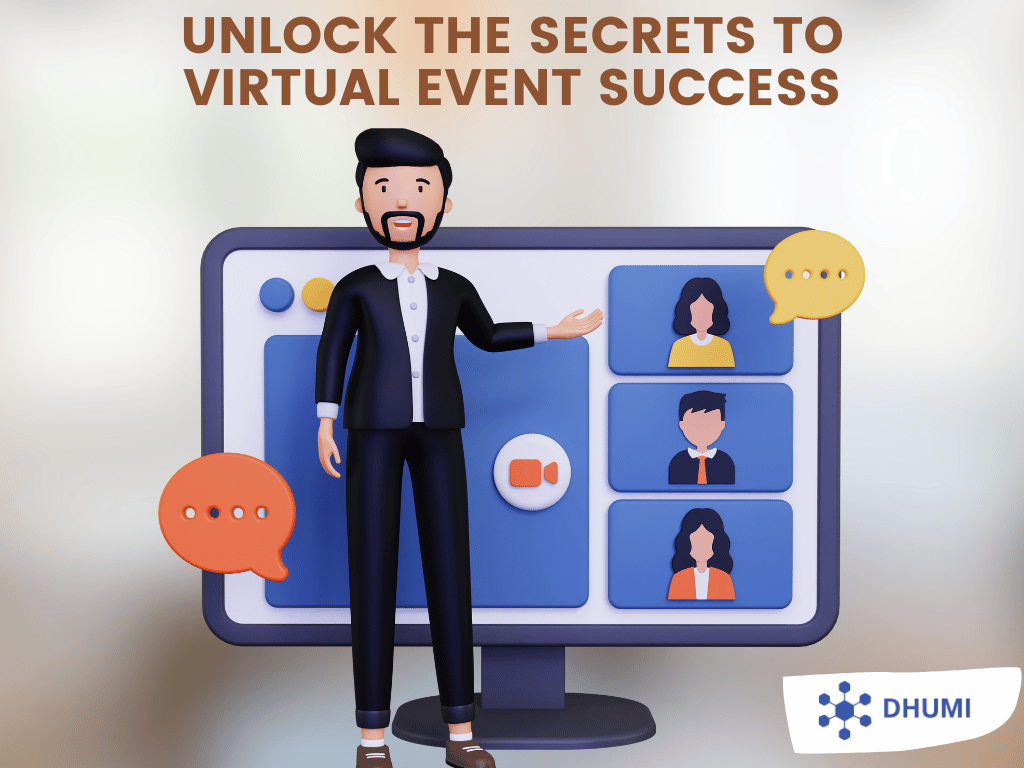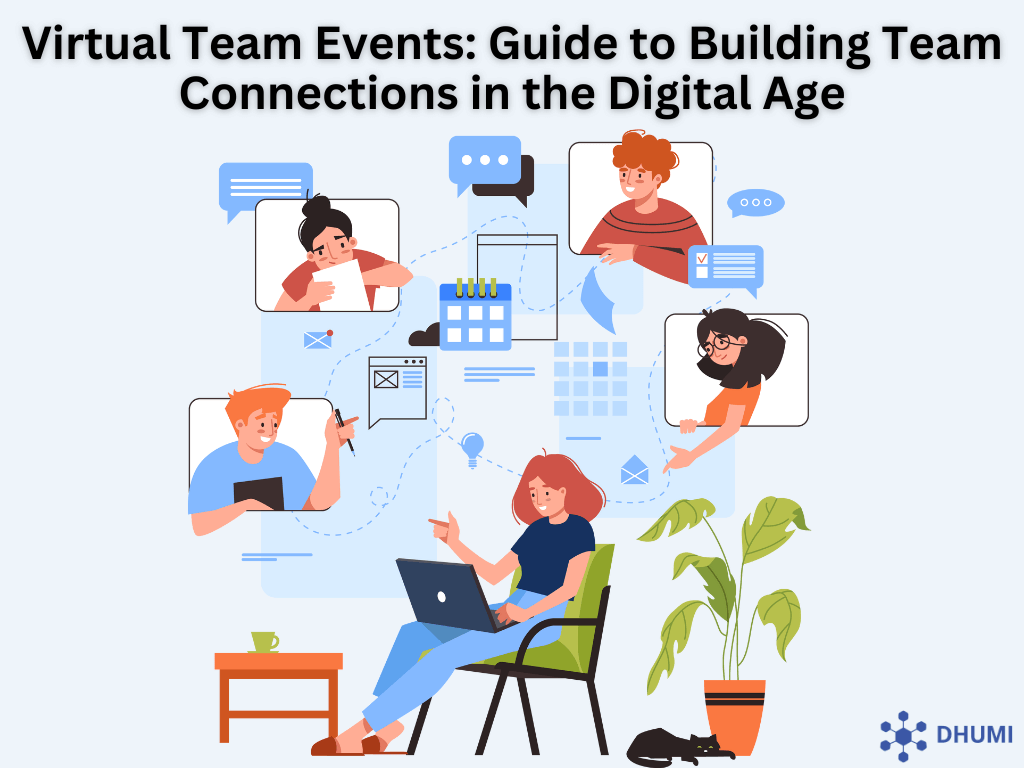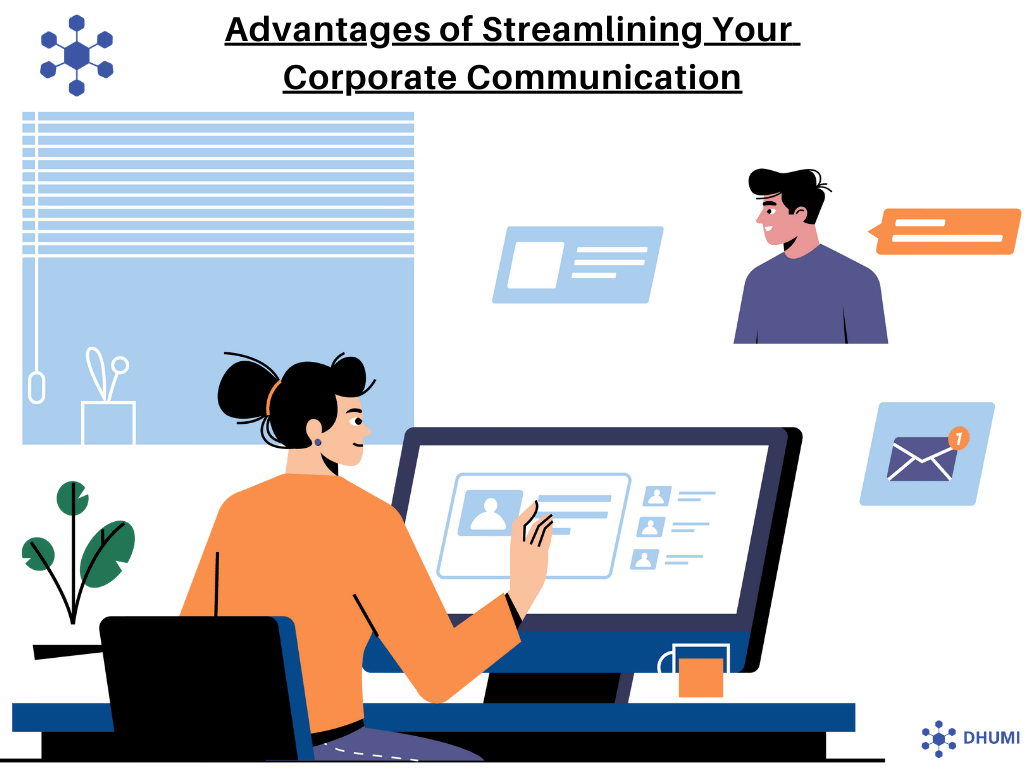
How to Succeed in the Era of Virtual Events
The pandemic has revolutionized our communication and interactions, making virtual events the new norm. While they may present certain challenges, virtual events can bring many advantages and new norms. While they may present specific challenges, participating in online events can also bring many advantages.
In this blog post, we'll look at making the most out of virtual events to ensure their success in this new era, such as networking techniques, creating engaging content creation strategies, and staying organized and prepared.
By following these simple steps, you can ensure online events become an enjoyable and profitable experience.
Adopt Technology for Virtual Events.
Success in virtual events requires using technology and all available platforms to provide your attendees with an enjoyable virtual conference experience. Video conferencing platforms, webinars, and live streaming capabilities can be fantastic tools to engage your audience live.
Incorporating interactive elements such as polls or Q&A sessions into these virtual events will further heighten engagement with the event.
Make sure your virtual event is accessible and user-friendly on mobile devices, and utilize virtual conference platforms to customize experiences for different target audiences.
This way, you can maximize its success while tracking user engagement. Using these tools, success in virtual events is assured!
Select the Appropriate Virtual Event platform.
Virtual events have emerged as an emerging form of event planning, and their success hinges on having the appropriate platform in place.
Do your research and select one that meets all your requirements for video conferencing, webinar hosting, or both; once this has been determined, you can research various options according to cost, features, security capabilities, and technical capabilities—and make sure the platform is easy for both event organizers and attendees alike!
Consider how well the platform will integrate with existing technology and support registration, payments, and communications. User feedback and ratings can also be invaluable when selecting an ideal virtual event platform.
Test it thoroughly first to ensure it meets all your needs before committing; doing so provides a successful virtual event that reaches a wide audience!
Host a virtual event.
At virtual events, planning in advance is vital to ensure their success. A thorough event plan with clear goals and objectives and assigned responsibilities is key to a smooth event experience. Furthermore, virtual event platforms offer solutions for managing registrations, streaming sessions, collecting data, and managing registrations more efficiently.
To maximize engagement, it is critical to identify strategies and best practices that will keep participants interested.
Establishing a communication plan outlining how you will reach the target audience is also essential; purchasing quality video and audio equipment and investing in interactive elements like polls or surveys will ensure maximum participation by participants.
Monitoring an event to make sure it runs efficiently is important while gathering feedback from participants following it is also key to its success.
By taking time to plan and organize a virtual event well in advance, its success can be guaranteed.
Create Engaging Virtual content (Virtual event ideas)
Virtual events require special consideration for successful completion, so using technology to your advantage to deliver engaging virtual experiences is key to ensuring they run smoothly.
You can employ various strategies to make virtual events successful and utilize tools available, such as virtualization software, to help ensure an unforgettable virtual event experience.
Before planning a virtual event, establish its purpose and ensure all activities align with it. This will help ensure its focus and success.
Use virtual tools, platforms, visuals, and music to create an immersive and exciting virtual environment; add polls, surveys, and interactive activities that keep participants engaged while encouraging meaningful discussions among participants.
Virtual networking tools are also essential to creating engaging events, as they enable attendees to make meaningful relationships at events with people with similar interests.
Live streaming can also be utilized for broadcasting purposes while adding gamification elements can add an extra level of fun and make attending even more enjoyable.
Finally, use analytics and data to assess the success of an event and improve future ones. Analyzing attendance information and feedback from attendees can provide you with greater insights into its effectiveness and help you make adjustments for subsequent ones.
Utilizing these strategies will ensure a successful virtual investment experience.
Also ReadOnline Team Builders: A Comprehensive Guide to Remote Team Building
Promote Your Virtual Event effectively.
At virtual events, developing a strategic marketing plan with clear goals and objectives is critical to ensure their success. Utilizing social media as a promotional channel and engaging your target audience is a proven method for increasing registrations and attendance at virtual events.
Email marketing can also help build anticipation and encourage registration for an event, while a video is essential to keeping attendees engaged with your storyline. Investment in digital advertising is an efficient and cost-effective way to reach more attendees and raise the profile of your event.
Building relationships with influential figures within your field and industry thought leaders are also beneficial for broadening your reach and creating additional buzz. Content that resonates with your target audience will help drive registrations and attendance at virtual events.
In contrast, interactive features that create an unforgettable event experience are the keys to standing out from competitors. Analyzing data and measuring success will enable you to continually optimize and ensure its success.
Build Relationships with attendees.
Here are some tips for successfully conducting virtual events: Before and after your virtual event, connect with attendees via chat to create personal connections and establish lasting relationships.
After the event, continue any dialogue you had with attendees by following up through email or scheduling virtual one-on-one coffee meetings to continue the conversation.
Create an online community such as Slack to allow attendees to remain in contact after your virtual event. Send virtual gifts as thank-yous or show how much you value their participation; inviting alumni groups may also be beneficial for staying in touch.
Speak with attendees after your virtual events have concluded to gather their feedback and experiences; this will give you invaluable insight into what worked well and where improvements could be made.
Social media can also be used to reach out and connect with attendees more directly; by doing this, you will build long-lasting relationships and ensure continued success in virtual events.
Provide Outstanding Customer service.
Virtual events present businesses with unprecedented opportunities. Customer service must play a central role in your event strategy to take full advantage of them.
Communication protocols and expectations must be set clearly to ensure an enjoyable virtual experience for all parties involved; reliable customer service technology tools should also be utilized; and finally, customer feedback must be used as an opportunity for growth in this digital sphere.
Use customer service analytics to identify areas for improvement and create strategies to address them.
Provide customer service representatives with the knowledge necessary to effectively handle customer queries in a virtual environment by training them accordingly, offering live chat, email, and telephone support channels, and automating routine tasks.
Reducing wait times with customer service software automation can be a valuable addition to customer experience strategies.
Monitoring customer service performance metrics is vital to customer satisfaction. Customer service representatives must also know about event programs and products best to provide optimal services.
Incorporating virtual environments into customer service strategies will allow businesses to maximize success regarding virtual events. By following these tips, businesses can ensure customer loyalty is maintained.
Monitor and Analyze Virtual Event metrics.
As virtual events become more widespread, it is imperative to measure key performance indicators to ensure their success in this new era.
Understanding whether your event resonates well with attendees and whether your marketing efforts are successful is among the top metrics you should measure.
Measuring attendance rates and user engagement provides you with an indicator of its success and ways to improve it; additionally, analyzing attendee feedback and audience demographics will allow you to target future virtual events more precisely.
Analytics tools effectively track user engagement, conversion rates, and other key performance indicators at events. Tracking engagement during an event also gives valuable insights into what works.
It doesn't work—data that can then be used to make more informed decisions regarding event content and messaging.
Successful virtual events depend on tracking key performance indicators and using data to make decisions. By measuring attendance rates, user engagement rates, and attendee feedback, you can gain an idea of the success of your event and identify areas for improvement.
Furthermore, using analytics tools during the event and tracking user engagement can provide valuable insight into what works and doesn't work and help ensure future virtual events will be even more successful than before.
Maintain a Continuous Improvement Strategy for Virtual Event Hosting Services.
As our world increasingly shifts online, virtual events have become essential for staying in touch, increasing engagement, and reaching target audiences. Success requires careful planning, using appropriate technologies, and considering user experiences when organizing these virtual events.
Prioritizing the user experience is central to virtual event success. This requires designing every event with attendees' needs in mind and offering intuitive and engaging experiences that are easy to use. Utilizing technology to create dynamic and interactive experiences keeps attendees engaged and motivated.
Data and insights are also critical to success. By monitoring attendance, engagement levels, and other key metrics, you can gauge the success of each virtual event and use this information to fine-tune its strategy while meeting attendees' needs and expectations.
Listening carefully to feedback from attendees after every virtual event is critical for ongoing success and should be used to inform changes to virtual event strategies and provide the best experience. Quick adaptation to changing trends and technologies is necessary to ensure long-term success.
Promote the event using traditional and digital marketing channels to reach the appropriate target audience for each virtual event. With an effective plan in place, virtual events can be successful.
Succeed in the virtual events trends.
Virtual events have revolutionized how businesses interact with their audiences. Organizations must learn how to craft an unforgettable and captivating experience for attendees to thrive in this new era of events. A few tips for planning virtual events include:
- Using the latest event technology.
- Adding interactive features.
- Creating virtual networking opportunities.
- Using social media channels.
Utilizing cutting-edge event technology is integral to designing an engaging virtual event, whether live or virtual. Interactive features like polls, Q&A sessions, and live chat are great ways to keep attendees engaged during a virtual event; virtual networking opportunities like virtual networking lounges or one-on-one meetings can further add engagement.
Leveraging social media is essential for spreading the word about an event and connecting with attendees before, during, and after the event.
Investment in quality production and streaming technologies is crucial to creating a smooth event experience, including reliable ticketing options that meet various budgetary constraints, ticket price variability, and monitoring attendee engagement and feedback tracking to continuously optimize event experiences.
By following these suggestions, organizations can establish an efficient workflow system.
What Is A Virtual Event?
Virtual events have quickly become increasingly popular due to their accessibility, affordability, and flexibility. A virtual event takes place online and attracts attendees from around the globe; examples include webinars, online conferences, virtual trade shows, and more.
Virtual events offer similar networking, learning, and relationship-building benefits as traditional events, plus additional advantages such as reduced costs, greater flexibility, and greater reach, allowing attendees from different continents to attend simultaneously.
Event professionals need to recognize how virtual events work to achieve success in this new era of events. Event organizers must grasp the capabilities of the virtual platform they are using and its technology to provide attendees with an engaging event experience.
Furthermore, they should plan for technical issues during their event while being prepared for any technical glitches; marketing strategies to maximize participation; plans for marketing promotions to maximize participation rates; and incentives that encourage attendees to remain engaged throughout.
Follow these tips for successful virtual events for event professionals to ensure their goals are reached.
Why choose a Virtual Event Over an In-Person Event?
As the event industry evolves, virtual events are growing in popularity. Virtual events provide numerous advantages compared to in-person counterparts, including greater reach, cost-effectiveness, flexibility, engagement, scalability, and accessibility.
Attendees no longer need to worry about geographical restrictions as virtual events allow you to reach a broader audience. Furthermore, virtual events tend to be more cost-effective than in-person ones, as attendees do not incur travel or accommodation expenses for attending.
Virtual events provide more flexibility in scheduling and content than physical ones, making it easy to include interactive tools such as polls, Q&A sessions, breakout rooms, or polls to keep attendees engaged while broadening your event's reach.
Virtual events are more eco-friendly than in-person ones, as attendees don't need to travel for attendance. Furthermore, virtual events are far more scalable than in-person ones since there are no physical limits on participant numbers; finally, virtual events provide greater accessibility for people with disabilities or mobility issues because no physical movement is required for attendance.
Virtual events offer an effective and cost-efficient solution for reaching a broad audience and saving costs.
How Can I Choose the Correct Virtual Event Platform?
Digital technology has revolutionized business operations, and virtual events are gaining popularity. Hosting one can help build connections with new and old customers while cultivating community around your brand. But success requires careful planning and appropriate tools. Here are some strategies for success in virtual event environments.
Researching the top virtual event platforms to find one that meets your specific requirements should be your top priority. Think carefully about what features will make a difference for the event you are hosting and any features needed for its successful hosting, then research platforms with good customer support that can assist with troubleshooting technical difficulties as needed.
Reading user reviews of the platform to ensure reliability and ease of use; asking about cost and any hidden fees or extra charges before selecting a virtual event platform that can host as many attendees as you anticipate attending your virtual event platform research should provide answers!
Check that the platform allows you to customize the appearance and feel of your event, is secure, and meets all applicable data protection laws. Look for platforms offering additional features like polls, surveys, and live Q&A sessions in multiple languages.
What Kind of Content Can Be Offered at Virtual Events?
Businesses today are moving into the virtual realm, making it essential to create engaging and successful virtual events. To ensure success in this area, businesses must take some important steps.
One key aspect of a successful virtual event is providing educational content—this could include webinars, podcasts, and digital courses—so attendees are engaged and learning something new. Businesses can even use Q&A sessions, group discussions, and polls to further engage attendees and foster interactive sessions.
Businesses looking to host an engaging virtual event should incorporate various content formats—presentations, videos, and infographics may all work well—along with live streaming and virtual reality technologies that add even greater engagement.
Businesses should use social media channels and virtual event platforms to ensure attendees know about and are prepared for events while making their event experience enjoyable and tailored to them.
Businesses looking to foster engagement and collaboration should utilize chat rooms or virtual breakout rooms to increase engagement and collaboration among attendees. This allows attendees to network and work collaboratively in an informal manner.
How Can I Measure the Success of a Virtual Event?
Setting goals and objectives is vital to the success of virtual events. Achieving this requires having a clear idea of what the event's goals are intended to accomplish and then tracking how many attendees attended your event.
Monitoring engagement during an event will enable you to keep tabs on its level of participation and satisfaction with surveys or key performance indicators (KPIs) to assess its success. By evaluating attendee responses to your event, you can better understand its success.
Assessing its return on investment (ROI) is critical to measuring its success; after-event media coverage may provide additional insight. By considering all these elements together, virtual events will be successful!






